
"I Tessori di Napoli" is an ambitious project which aims to produce a
comprehensive anthology of Neopolitan music of the 17th, 18th, and early
19th Centuries in the form of a series of 50 CDs issued over 10 years. The
1999 catalogue lists current and projected volumes up to No. 19 and includes
a fascinating array of cantatas, motets, liturgical settings, opera buffa,
compliations of arias and instrumental music. The discs are accompanied by
extensive notes by Dinko Fabris (director of research at the "Pieta de' Turchini"
Early Music Centre) which set the music in the context of Naples' long and
colourful history which has been by turns Roman, Byzantine, Norman, Angevin,
Spanish, Austrian and Bourbon.
The current issue, Vol. 9 in the series, presents eight orchestral and sacred
vocal works from the mid 18th Century by Jomelli (four pieces), Barbella,
Cafaro, Porpora and Sabatino (one each). Throughout its history the cultural
life of Naples influenced, and was influenced by, other European centres
and the fusion of styles is evident in this music. All these composers were
nurtured in the Naples music conservatories and were directly or indirectly
cultural desendents of Provenzale and Alessandro Scarlatti. At the same time
the music is innovative and anticipates later developments which in due time
were to reach their zenith in the works of Mozart and Donizetti.
The disc opens with a lively and captivating rendering of the title work
"Veni Creator Spiritus" by Jomelli which sets the tone for the whole disc.
Whilst Jomelli's music occupies nearly half the disc, Sabatino's motet "Vola
turtur de nido" is the longest and undoutetly most impressive piece. In reality
it is a large scale cantata for soprano solo with violins and viola; these
apparently limited resources belie the richness and intensity of the writing.
Fabris' description of it as "one of the most extraordinary works of the
entire [eighteenth] Century" is possibly over the top; nevertheless it can
be bear honourable comparison with Mozart's "Exultate Jubilate", the subject
and musical style of which it anticipates by more than 40 years - in its
alternately slow and fast movements with linking recitatives and final bravura
"Alleluia".
The Cappella de' Turchini is a seventeen-piece band of strings, woodwind,
horns, and harpsichord. The performances under the direction of Antonio Florio
are perfectly attuned to the music; the playing has a resonence and sonority
which is fully satisfying to 21st Century ears whilst retaining the bounce
and brilliance of authentic baroque. This is a wonderous disc for all who
wish to extend their discoveries of neglected masterpieces of 18th Century
Italy.
Reviewer
Humphrey Smith


